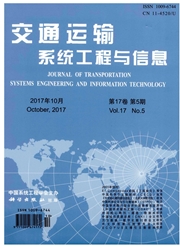

 中文摘要:
中文摘要:
交通需求管理和控制与时间因素密切相关,对出行时耗的研究是出行行为分析的重要内容.本文提出了用于出行时间分析的持续时间模型,讨论了通勤者日出行时间投入随出行者及其家庭社会经济属性、活动和出行特征变化的连续分布规律.模型用已投入出行时间约束下出行结束的条件概率更准确地描述了出行的动态过程,从对活动与出行之间派生和竞争关系的分析,部分地反映了通勤者的时间分配行为.分析表明,出行时间最小化的行为假设对大多数通勤者成立.本研究为出行时耗的定量研究提供了更准确有效的分析工具,对于准确把握通勤者时间分配行为有重要意义.
 英文摘要:
英文摘要:
Travel demand management strategies and transportation control measures are inherently linked to the time dimension. In this paper, the duration model approach, which integrates the notion of the temporal dynamics, is applied to analyze the commuters' daily travel time cost. The relationships between daily travel time and socio- demographic attributes and activity and travel characteristics are explored. The time use pattern is partly represent- ed by the derivative and competing relationships of activity and travel. The research results indicate that the behav- ior of most commuters can be described by travel time minimization mechanism. This research enriches the quanti- tative analysis method of travel time and is of great importance for a precise understanding of commuters' time allo- cation behavior.
 同期刊论文项目
同期刊论文项目
 同项目期刊论文
同项目期刊论文
 期刊信息
期刊信息
